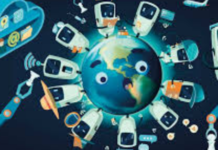Artificial Intelligence (AI) is revolutionizing various sectors, and healthcare is no exception. The potential of AI to transform healthcare is immense, as it promises to make medical processes faster, more accurate, and more efficient. From diagnosis to treatment, AI is set to change the landscape of healthcare in the coming years. Here’s how AI is shaping the future of healthcare and what we can expect moving forward.
AI in Medical Diagnostics
One of the most promising applications of AI in healthcare is in diagnostics. AI systems, especially those powered by machine learning and deep learning, have shown remarkable abilities in identifying diseases from medical images such as X-rays, MRIs, and CT scans. For instance, AI algorithms are being trained to detect early signs of cancer, heart diseases, and other serious conditions with high accuracy, sometimes even outperforming human doctors.
In the future, we can expect AI to be integrated into routine diagnostics, enabling faster and more precise analysis of medical data. This will allow healthcare professionals to diagnose conditions earlier, leading to better treatment outcomes and potentially saving lives.
AI-Powered Personalized Treatment Plans
AI’s ability to analyze vast amounts of patient data in real-time opens the door to personalized treatment plans. By leveraging data from electronic health records (EHRs), AI can recommend tailored treatment plans based on an individual’s medical history, genetic information, and lifestyle. This is particularly useful in chronic diseases like diabetes, cancer, and heart disease, where personalized treatment could significantly improve patient outcomes.
In the future, AI-driven systems may also help doctors predict how patients will respond to specific treatments, optimizing therapies and reducing side effects. This level of personalization could make healthcare more effective and accessible to patients worldwide.
Robotic Surgery and AI-Assisted Procedures
Robotic surgery is another area where AI is making inroads. AI-powered robots are being developed to assist surgeons in performing complex operations with greater precision and control. These robotic systems are equipped with advanced algorithms that allow them to perform repetitive and delicate tasks with a level of accuracy that surpasses human capabilities.
As AI technology advances, we can expect more autonomous systems capable of performing intricate surgeries with minimal human intervention. This could lead to less invasive procedures, faster recovery times, and reduced risks of complications.
AI in Drug Discovery
The pharmaceutical industry is also benefiting from AI, particularly in the area of drug discovery. AI algorithms can analyze vast datasets to identify potential drug candidates at a fraction of the time and cost of traditional methods. By simulating how different compounds interact with the human body, AI can help researchers quickly identify promising drugs and even predict their side effects.
In the coming years, AI is expected to play a critical role in accelerating drug discovery and development, bringing new treatments to market faster and more efficiently. This will be especially important for tackling complex diseases such as cancer, Alzheimer’s, and emerging infectious diseases.
Virtual Health Assistants and AI-Powered Apps
AI-powered virtual assistants and health apps are becoming increasingly popular, helping patients manage their health and wellness more effectively. These tools can offer reminders for medication, monitor symptoms, and even provide advice based on real-time health data.
In the future, AI-driven virtual health assistants could become more sophisticated, offering support in managing chronic conditions, mental health, and general wellness. This could reduce the burden on healthcare professionals and empower patients to take greater control of their own health.
Ethical and Regulatory Considerations
While the future of AI in healthcare is exciting, it also raises several ethical and regulatory concerns. Issues such as data privacy, algorithmic bias, and the potential for AI to replace human jobs must be addressed. It is essential to ensure that AI systems are transparent, fair, and accountable, especially when they are being used to make life-and-death decisions.
The future of AI in healthcare is bright, with the potential to drastically improve the way we diagnose, treat, and manage health conditions. As technology advances, AI will play a crucial role in delivering more personalized, efficient, and accessible healthcare to patients around the world. However, it is equally important to navigate the ethical and regulatory challenges to ensure AI is used responsibly and equitably in the healthcare industry.






